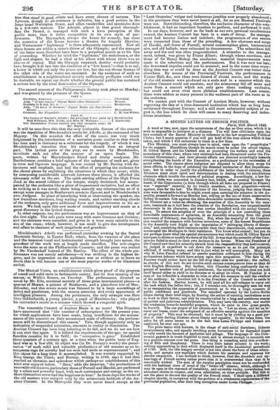The second concert of the Philharmonic Society took place on
Monday; and was graced by the presence of the Queen.
PART I.
Overture, Anacreon Cherubini.
Aria, "II mio tesoro," Signor Mario (Don (Jloranni) Itiozart.
Sinfonla In B flat, No. 4 Beethoven. Aria, "In term el diviseor," Signor Mario (Le Due Illuatri
Rivali) Mercadante.
Overture, Der Freyschtitz C. 31. von Weber.
PART II.
The Lyrics of Racine's Atlialie; the principal Voice parts byl Mendelssohn Miss Williams, Mrs. Noble, and Miss M. Williams f Bartholdy. The Illustrative Verses recited (on this occasion only) by Mr. Bartley.
It will be seen from this that the only noticeable feature of the concert was the repetition of Mendessobn's music for Atha; at the command of her Majesty.. .0n this occasion the effect of the music was very much heightened by the introduction of a narrative poem similar to that which has been used in Germany as a substitute for the tragedy, of which it was Meadelssohn's intention that his music should form an integral part. The lyrical parts of the play, set to music by Mendelssohn, terminate each act after the manner of an opera finale. The poem, written by Mendelssohn's friend and trusty coadjutor, Mr. Bartholomew, contains a brief epitome of the substance of each act, given in terse and vigorous language.' It was recited by Mr. Bartley with dis- tinctness and emphasis, and had the effect of preparing the audience for the choral pieces by explaining the situations in which they occur; while, by interposing considerable intervals between these pieces, it afforded the necessary relief to the ear. The spirit-stirring address of the High Priest Joad to the armed soldiers of the temple, simply declaimed, but accom- panied by the orchestra like a piece of impassioned recitative, had an effect as striking as it was novel; there being scarcely any otherspecime us of it except some passages in Beethoven's music to Egmont, and in Mendelssohn's own' Antigone. In place of interfering with or obstructing the speaker, the low tremulous murmurs, long wailing sounds, sod sudden startling chords of the orchestra, only gave additional force and impressiveness to his ac- oente. We look upon this new mode of combining poetry and music as a great discovery in the lyrical drama.
In other respects, too, the performance was an improvement on that of the first night. The solo parts were sang with more firmness and decision; and the choruses were smoother, and given in a tone more suitable to the size of the room; which, however, is too smell to give due development and Affect to choruses of such magnitude and grandeur.


























 Previous page
Previous page